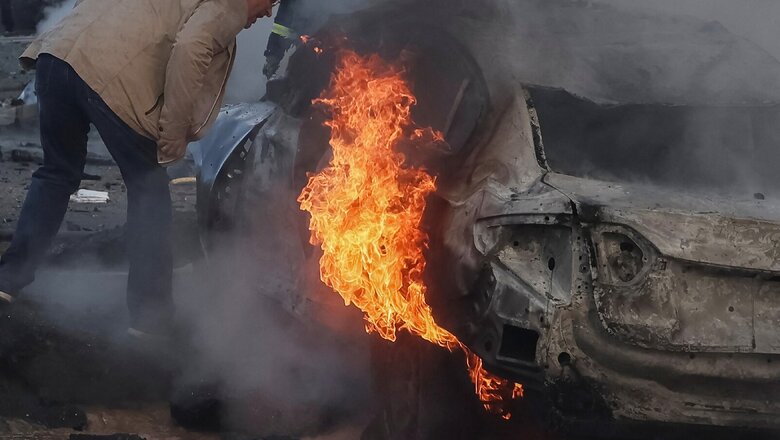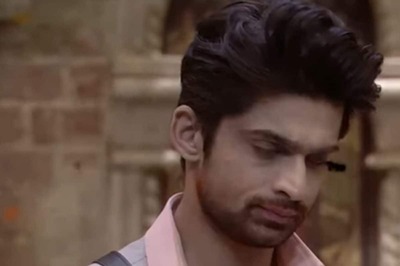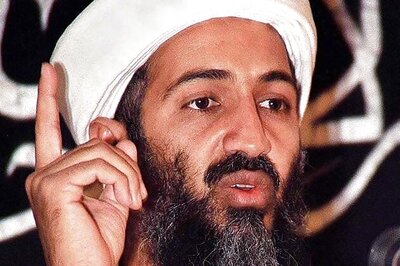
views
In what could turn out to be a very first step towards trying to help end the Ukraine War, Prime Minister Narendra Modi has revived talking to the leaders of the warring nations after his early attempts at commencements, months ago. The moral fibre attaching to India’s Gandhian image, coupled with the impossibility of the evolving situation in Europe, where there is no peacenik, should keep India and PM Modi at the centre of any such endeavour.
As expected, and was to be expected under the circumstances, Modi has spoken to Ukraine President Volodymyr Zelenskyy on fortnight. That was after he told Russian President Vladimir Putin on the side-lines of the SCO Summit, at Samarkand, Uzbekistan, last month that this was ‘not an era of war’.
According to an official statement, in his telephonic conversation with Zelenskyy, the “Prime Minister reiterated his call for an early cessation of hostilities and the need to pursue the path of dialogue and diplomacy. He expressed his firm conviction that there can be no military solution to the conflict and conveyed India’s readiness to contribute to any peace efforts”.
It is this last part that has given some hope of a possible end to the war, however remote. Instead, however, the US President, Joe Biden, the power behind Ukraine, for now, has focussed on Russian leader Vladimir Putin’s threat to use nuclear weapons, if it came to that. Such a course could force the world into an Armageddon, Biden has said.
Reversing the flow
Much water has flowed between the SCO Summit in mid-September and Modi now talking to Zelenskyy. Putin has endorsed the referendum in Ukrainian regions captured by the Russian forces in the early months of the war, which began in February, and merged/annexed them into Russian territory. Zelenskyy has decreed them as void, and his office said the merger is ‘worthless’.
The Ukraine forces, in their turn, have made substantial gains on the ground, retaking some of the territories ‘occupied’ by the Russians. At present, the war is evenly poised, if not on the side of Russia. The question is if Ukraine would be willing to negotiate from a position of strength, and will Putin like to cut down his losses, if they are any on the territorial front but certainly to his prestige and that of the Russian state.
Needless to point out that Ukraine as a nation and Zelenskyy as a leader cannot afford to settle for anything less than a full withdrawal of Russia and Russian forces from ‘annexed territory’. Leaving aside the big hit on Russia’s international standing and Putin’s own prestige nearer home, the constitutional processes involved in reversing the referendum process also needs to be studied closely, if that has to be the long-term solution.
The global perception is that after the recent battle-front reversals, as reported by the western media in particular, Putin would want peace and early. If these reports are to be believed — and there is no reason not to believe them — his forces are taking big-hits, one after another, in men and material. Internally, however, he cannot afford to lose.
Forgotten first part
Through the past months, India has diligently and intelligently drawn the line between procuring cheap Russian oil and expressing a desire for an early end to the war. Modi telling Putin that it was ‘not an era of war’ may have implied that India acknowledged that Russia started it.
Yet, the current western mood, triggered by the war that Russia started, has sought to obfuscate the real Russian intent behind it. Moscow started the war after years of calls for the US-led NATO not to get any closer to the Russian border than already, this time, by admitting Ukraine.
The Kremlin only needed guarantees and commitments, of which the US said there was none from the nineties. Against Moscow’s earlier appeals, the NATO had admitted other erstwhile Soviet member-states, bringing future adversity closer to the Russian borders.
Larger fallout
Russia and Ukraine are at war and they do not have the time and mood to think about things that their military engagement has wrought on the rest of the world. Western Europe, especially nations like Germany, have suffered an unanticipated and even more unwelcoming energy crisis, which could turn the nation upside down, especially in the upcoming winter months. But they are not ready to give up on Russia, hence backing Ukraine becomes a fait accompli to American decisions as the NATO leader.
Western Europe and Russia have blamed each other for allegedly sabotaging the Nord Stream Pipelines I & II, which were supplying Russia’s natural gas to Europe. Alternatives are being sought and found, but sustaining them at a higher cost could cause many European economies to collapse, either now or later. Russia, depending on petro-dollars, or rupees would be hit even more, especially after burning its roubles on a war it could have done without.
But the real hit also includes distant nations like India, and also China, another of Asia’s emerging power-houses. Both nations, along with many others across the Third World, were hit by what promised to be a steep rise in petroleum product prices, especially by the US-led European sanctions on Moscow.
It does not stop there. Unlike often imagined, or left unimagined, the global connectivity issues in terms and foods and other commodities hit Third World nations on the head when the war in distant Ukraine cost shortages and steep rise in prices. That it should happen in the post-Covid recovery period showed how much the world was dependent on foodgrains from Ukraine, a fact that most nations had ignored or taken for granted.
Qualms and compulsions
Russia saved the day for itself and the rest by exporting oil at cheaper prices to nations like India and China. Yet, sailing between two geo-political boats with geo-strategic intent, India has been finding the balancing act difficult to sustain it beyond a point. Jumping to one boat is not an option. That has also made India the best candidate to play facilitator. China has no such qualms and compulsions, hence, it playing the peace-broker is off from a Ukrainian/Western perception.
At the UNSC, where India’s elected term ends this December, the nation has continually abstained from voting on Russia-related resolutions. The latest is one of condemnation after Putin warned of a nuclear-attack. This is the weakest of India’s positions that New Delhi would find it difficult to defend in the coming years and decades, too.
China, too, has abstained from all the UNSC votes that India did, but for its own independent reasons. As a veto-power, it did not support Russia, which would have made a lot of difference. At the end of the day, it was only Russia’s own vote that saved the day for Moscow, and more than on one occasion, over the Ukraine War. No other UNSC member, elected or otherwise, backed Russia even on a single occasion.
When shadows govern
Does it all qualify India to play the mediator between Russia and Ukraine, rather between Russia and the West? On the one side, there is Russia, whatever be the internal pressures that Putin may face if and when he chooses to sit at the negotiations table.
On the other side, there are at least three, if not more parties. Not all of whom would not sit on the table, but whose shadows would govern the proceedings, all the same. One of course is Ukraine, where Zelenskyy may have his own internal pressures, plus and minus. From the outside, as if speaking for the US-led G-7, Japan Prime Minister Fumio Kishida has called Zelenskyy to reassure him of his nation’s support against Russia’s ‘annexation’. The US pressure on Ukraine for not yielding is for taken.
Then, there are the nations of western Europe, of NATO, who want an early solution, without compromising and being seen as compromising, or letting down Ukraine. After all the wars that they had fought among themselves through the past centuries, western Europe especially does not have the stomach for going down that road any more. Not after the two Great Wars of the previous century. Needless to point out, the wars that the West fought after the Second World War were all in Asia, namely, Korea, Vietnam, Afghanistan and Iraq.
Facilitator, negotiator
For now, going by reports Putin and Zelenskyy are expected at the G-20 Summit, at Bali, Indonesia, on 15-16 November. India is the next chair of G-20 and massive preparations are on, for hosting the next annual summit. As it turns out, India is also hosting the SCO Summit in 2023.
Where does all this leave India? Or, is India up to it, as a peace-facilitator or negotiator? There is a distinction between the two terms. In New Zealand recently, the External Affairs Minister (EAM) publicised how he acted on a ‘request’ and pressed Russia on the safety of the Zaporizhzhia nuclear power plant, close to the war-zone in Ukraine. Despite being the fifth largest economy just now, India is not that high in the global pegging order in geo-political and geo-strategic terms. Or, so goes certain perceptions.
If Western leaders had paraded to New Delhi earlier in the year, it was not to seek India’s intervention to help end the Ukraine War early on. It was to try and persuade India to give up on Russian oil, for their sanctions on Moscow to be more effective. Leave aside India’s fitting reply that most of them were still buying Russian gas – ‘what India gets in one month, they get it in one afternoon’ – such a folly on New Delhi’s part at the time would have deprived them of a facilitator/negotiator that Russia would still trust.
If anything, three months after President Biden’s humbling visit to Saudi Arabia after his country had riled Riyadh through the past years over the ‘Khashoggi killing’, the Gulf kingdom has led OPEC+ into a daily production-cut of two-million barrels. The US had wanted free flow of OPEC and OPEC+ oil to cut Third World dependence on cheap Russian oil, made available in the face of the Ukraine War. The Gulf-Arab nations that once used to take orders from Washington are in no mood to oblige any more.
This means that the coming winter in western Europe could be colder than any time since gas/electricity-based heating became possible. That is saying a lot in terms of an early end to the war and resumption of Russian gas, as a combined package in their case.
The UN, that supposed-to-be ‘honest broker’, already stands exposed on Ukraine, as in Afghanistan and Iraq, in the post-Cold War era. At the same time, too much has happened between Russia and Ukraine, Putin and Zelensky, for them to wait for the other to blink first. Too much is at stake for the world.
India, and India alone, has positioned itself in a way, though mostly unintentionally, where it could be of help, if at all any nation can help. Yet, India should not venture out unless it gets iron-clad guarantees about their own behaviour from nations that are not at war just now. That is saying a lot, but nothing else may help, either.
The writer is a Chennai-based policy analyst and commentator. Views expressed are personal.
Read all the Latest Opinion News and Breaking News here


















Comments
0 comment